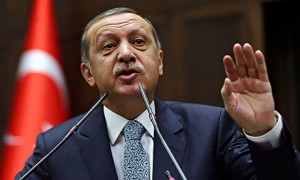Special to WorldTribune.com
ANKARA — Turkey, which is under intense pressure from NATO over its procurement of a China’s ballistic missile defense battery, might copy it and claim it as an indigenous system.
Western diplomats said NATO has assessed that Ankara could indefinitely delay signing an agreement for China’s HQ-9 BMD system.

Instead, the government of Prime Minister Recep Erdogan, seeking to avoid Western pressure, could approve an indigenous BMD program quietly supported by Beijing.
“Turkey already has been expanding its defense and military cooperation with China, so the addition of additional personnel or training in Beijing might come under the radar, or at least be deniable,” a diplomat said.
Under pressure from the United States and other NATO members, Ankara has twice delayed an award to China Precision Machinery Import-Export Corp. for HQ-9, a project valued at $3.4 billion. The Western alliance said it would not cooperate with any Turkish BMD network that contained a Chinese system, which bested the U.S.-origin PAC-3 and Europe’s Aster-30.
The Chinese company has been under U.S. sanctions for supplying missiles
to Iran and Syria. At the same time, the European Union has determined that
Turkey’s defense budget and programs were among the least transparent in
Europe.
The Erdogan government has now signaled that it could cancel the BMD
tender and launch an indigenous project. They said Turkey’s state-owned
Aselsan could be selected to head the project.
“Aselsan clearly does not have the capability to build such a system by
itself,” the diplomat, who tracks Turkey’s defense programs, said.
The latest deadline for negotiations with CPMIEC and other contenders
was set for April 30. Ankara has demanded significant technology transfer
and coproduction as part of any award.
Aselsan had been seen as the leading Turkish partner of CPMIEC. In
December 2013, a U.S. investment firm withdrew from a bid to help Aselsan
issue a listing on the Istanbul Stock Exchange.
“Beijing could secretly help Turkey not only in missile interception,
but in ballistic missile development,” the diplomat said.

You must be logged in to post a comment Login